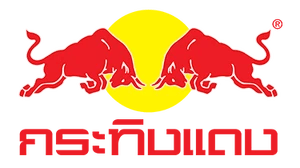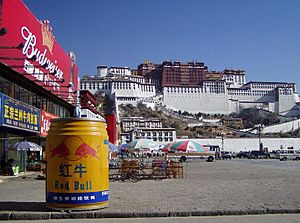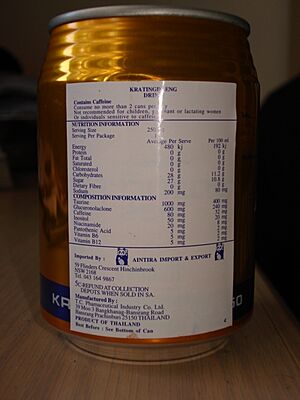Krating Daeng facts for kids
 |
|
| Type | Energy drink |
|---|---|
| Manufacturer | T.C. Pharmaceutical Industries Co. Ltd. |
| Country of origin | Thailand |
| Introduced | 1976 |
| Color | Yellow |
| Related products | Red Bull |
Krating Daeng (which means 'red bull' or 'red gaur' in Thai) is a popular energy drink. It does not have bubbles like soda. It was created by Chaleo Yoovidhya in Thailand. This drink is mostly sold in countries in Southeast and East Asia. A famous drink called Red Bull was inspired by Krating Daeng and is now sold in many countries around the world.
The name Krating Daeng comes from the gaur. A gaur is a very large wild animal, like a type of cow, found in Southeast Asia. The drink's logo shows two red gaurs charging towards each other, with a sun behind them. This image is a big part of the brand.
Contents
History of Krating Daeng
Krating Daeng was first made in 1975. It was introduced in Thailand in 1976. The drink was first meant to be a refreshing boost for workers in the countryside. It contains water, sugar, caffeine, taurine, and B-vitamins.
At first, the drink was not very well known. The company focused on selling it in smaller towns and rural areas. Other energy drinks at the time were more popular in big cities. Krating Daeng became more popular by sponsoring Muay Thai (Thai boxing) matches. The logo of the two red bulls was often seen at these events.
Today, Krating Daeng is not the top-selling energy drink in Thailand. Other brands like M-150 have become more popular there.
How Krating Daeng is Connected to Red Bull

The Krating Daeng drink from Thailand is made by a different company than the global Red Bull brand. Red Bull was co-founded by Dietrich Mateschitz, an Austrian businessman. In 1982, Mateschitz visited Thailand and found that Krating Daeng helped him feel better after a long flight.
He then worked with Chaleo Yoovidhya's company, T.C. Pharmaceuticals. They changed the drink's recipe a bit to suit tastes in Western countries. The new drink, Red Bull, was launched in 1987.
Many people think these two companies are the same, but they are separate. They work together but focus on different markets. The Yoovidhya family, who created Krating Daeng, owns more than half of the Red Bull GmbH company. This company sells Red Bull in Europe and the United States.
It can be a bit confusing because the Thai company sometimes uses the name "Red Bull" on its products. For example:
- The classic Krating Daeng can often says "Red Bull" along with "KRATINGDAENG".
- Some special Krating Daeng products in Thailand use "Red Bull" instead of "Krating Daeng".
- Products made by the Thai company in China also use "Red Bull".
- Some products sold in countries like Malaysia and Vietnam also use "Red Bull".
So, just seeing the name "Red Bull" on a can does not always mean it's the same Red Bull drink sold by Red Bull GmbH from Austria.
Krating Daeng in China
In China, two different companies use the "Red Bull" name and a similar golden can design. This happened because the Thai company (TCP Group) made two separate agreements with Chinese companies. The first agreement was in 1995. The second company was started by TCP itself in 2019.
Since 2016, these companies have been in legal disagreements. They both want to be the only one allowed to use the "Red Bull" name in China. Different courts in China have made different decisions about who is right.
Sponsorships
Krating Daeng has sponsored many different events and teams, especially in sports.
- E-sports
- Football
- Racing
- Volleyball
Ingredients
Krating Daeng has the same amount of caffeine as Red Bull sold in the US. Both drinks have 32 milligrams of caffeine in every 100 milliliters. This means a 250 milliliter can has 80 milligrams of caffeine.
Krating Daeng also contains taurine, glucose, and B vitamins. It is not a fizzy drink.
A 250 milliliter can of Krating Daeng, like one imported to Australia, typically contains:
- Taurine: 1000 milligrams
- Glucoronolactone: 600 milligrams
- Caffeine: 80 milligrams
- Inositol: 50 milligrams
- Vitamin B3: 20 milligrams
- Pantothenic acid: 5 milligrams
- Vitamin B6: 5 milligrams
- Vitamin B12: 5 milligrams
See also
- Kratingdaeng Racing Team
 | Jewel Prestage |
 | Ella Baker |
 | Fannie Lou Hamer |


